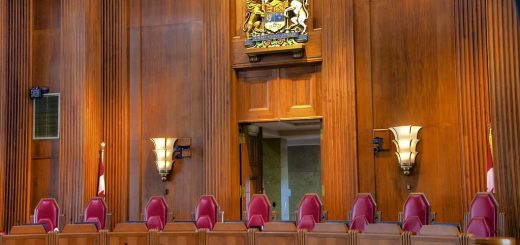Supreme Court Appointments: When Law and Politics Collide?
On September 5, Prime Minister Stephen Harper announced the nomination of Nova Scotia Court of Appeal Justice Thomas Cromwell to the Supreme Court of Canada. The press release can be found immediately below, as well as here. The naming of Justice Cromwell certainly comes as no surprise to legal analysts. In fact, a recent TheCourt.ca post by Philip Girard named Justice Cromwell as a strong candidate for the position, praising his “clarity, reasoning, and just results.” As well, Cromwell fits the bill in several other respects, namely his bilingualism (an ability that has been the subject of recent debate), and his Atlantic Canada roots (thus suitably replacing the New Brunswick-based Justice Michel Bastarache, and keeping with the appointment convention of maintaining regional representation).
Justice Cromwell was among the well-qualified frontrunners to fill Bastarache’s vacancy, and at this point, commentators from a variety of political affiliations seem to unanimously approve of the selection. I do not wish to comment on the specific choice of Justice Cromwell, but it is certainly difficult to ignore the problematic circumstances surrounding Harper’s announcement. More information is bound to trickle down in the coming days and weeks addressing the breakdown of the selection committee’s discussions, but at the time of this writing, a few nuggets of information have been revealed that raise concern regarding the possible politicization of this process.
Unrest brewed on the election panel even before the suspended deliberations began, when an August 11th Toronto Star article reported that NDP justice critic Joe Comartin disapproved of the panel’s members. The Liberal Party used a similarly-constituted selection panel during the last Supreme Court vacancy, at a time when the Liberals were concerned with issues of transparency and accountability. This panel consisted of representatives from the legal community and MPs, and the process yielded a short list of three candidates from which the Prime Minister chose Justice Marshall Rothstein.
In light of Justice Bastarache’s retirement, the Conservative party also established an advisory panel, but this time it only consisted of MPs who would narrow the larger group down to three candidates. This panel was to consist of two MPs from the current government and one from each of the Opposition parties. However, the two Conservative MPs chosen to sit on the panel were cabinet ministers, and in the aforementioned Star article, Comartin voiced his concern that “they’re not providing independent [advice], they’re just there as mouthpieces for the Prime Minister’s Office.” In the same article, Justice Minister Rob Nicholson countered Comartin’s accusations by reinforcing the fact that “the appointment of a Supreme Court justice is a function of the executive.” Nicholson’s assertion is echoed in the Constitution, which indeed places Supreme Court appointments solely in the hands of the Prime Minister. However, as I discuss below, mere constitutional permission to act unilaterally should not be the Prime Minister’s only concern.
Things became even more complex on Friday, when the PMO’s press release revealing Cromwell’s nomination attempted to explain the panel’s breakdown. The announcement stated that all three Opposition MPs failed to participate in the scheduled days of consultations, and that the first meeting of the panel could not consider substantive business because the Opposition objected to the panel’s composition. As a result, the Prime Minister suspended the work of the panel and selected Justice Cromwell.
Following the nomination announcement, Joe Comartin has spoken up again, stating that “[w]e have a Prime Minister and a Justice Minister playing politics with Supreme Court appointments … it shouldn’t happen.” His comments can be found here. As well, Nicholson again responded to Comartin’s gripes, clarifying that the selection panel “didn’t get anything done because the opposition had objections to the composition of the committee … and this month, a couple days of teleconferences had to be cancelled because no members of the opposition were available. So we’re moving forward on this.”
Previous debates on TheCourt.ca with regard to the intersection between law and politics have been spirited. However, whether one subscribes to the theory that the two concepts do, and should, remain distinct, or instead firmly believes that law and politics are inevitably intertwined, the problematic circumstances surrounding Justice Cromwell’s appointment cannot be ignored.
Consider this timeline. Justice Cromwell’s nomination is not yet official, as he must still face an ad hoc, all-party committee of the House of Commons. However, since Harper has now set a federal election date for October 14, the second part of the nomination process must be delayed, and Justice Cromwell will likely miss most of the Supreme Court’s fall session commencing on October 6. Given that Cromwell cannot join the Supreme Court any time soon, Harper’s expedient nomination appears to have solely been a political move. Harper’s suspension of the purported heel-dragging selection committee can now be used as an example of his decisiveness in an election lead-up. Decisive leadership will certainly be a platform issue for the Conservatives, since the leader of the Liberal Party, Stephane Dion, has been soundly criticized for lacking this very quality.
With Harper’s gamble comes risk, however. Though his speedy nomination of Cromwell will surely be utilized in his election campaign, his haste has compromised the purpose of the selection panel itself. The Liberals developed the selection committee process to maximize political accountability, something that the Liberals were criticized for lacking in light of their sponsorship scandal. Though Nicholson is correct in that the Prime Minister does have the constitutional authority to select Supreme Court justices, in his side-stepping of the committee, Harper has chosen swift decision-making over political transparency. Just in time for the federal election, Harper has used the Supreme Court nomination as a display of his strong leadership capabilities.
But at what cost has Harper made his choice? Though the issue of political transparency has now been blown open again, a larger concern is the use of the Supreme Court as a political tool. It should be clarified that even critics of Harper’s decision, such as the vocal Joe Comartin, acknowledge that Cromwell is neither left- nor right-leaning, and that he was a “prominent member” of the list of contenders for the bench prior to the committee’s suspension. There is no suggestion of partisanship in Cromwell’s case, but Harper has set a dangerous precedent. If the nomination process can be used to serve a political purpose, there is nothing to stop a Prime Minister from using his constitutional power to appoint a more partisan nominee in the future. The advisory panel was formed in light of such concerns. Though Harper’s bypassing of the panel may demonstrate his decisiveness and help his campaign, it has ultimately dealt a blow to future judicial independence.







Join the conversation